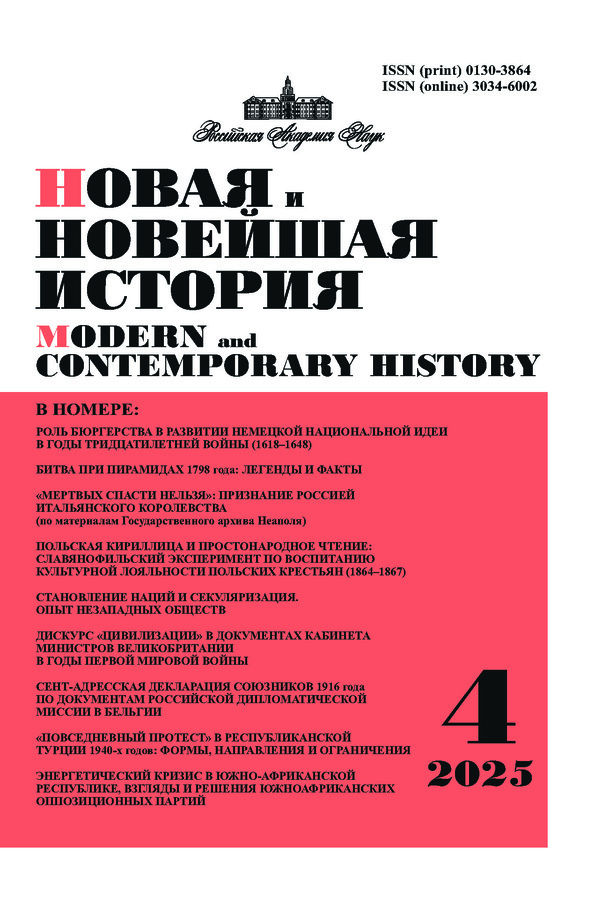The Particular Methodology of Historical Science
- Autores: Bobkova M.S.1
-
Afiliações:
- Institute of World History, Russian Academy of Sciences
- Edição: Nº 4 (2025)
- Páginas: 210-218
- Seção: Messages
- URL: https://journals.eco-vector.com/0130-3864/article/view/691870
- DOI: https://doi.org/10.31857/S0130386425040159
- ID: 691870
Citar
Texto integral
Resumo
This article examines the treatment of historical typology in an unpublished manuscript by Mikhail Abramovich Barg (1915–1991). The relevance of this subject remains significant, particularly in relation to the conceptualisation of historical periodisation – that is, the construction of temporal frameworks within the context of historical space and the formation of a global image of the past. Barg’s manuscript is noteworthy for identifying the immanent foundations of the theory of historical knowledge, as well as the methodological approaches derived from these foundations, which place typology at the forefront of efforts to understand and define historicism.
Even at the lowest levels of abstraction and in closest proximity to empirical reality, it scarcely requires argument that the proper subject of historical inquiry is neither “personalities”, nor “events”, nor isolated “cause-and-effect” relationships. Rather, it is the spatio-temporal unfolding of society
conceived as an integral whole – and therefore to be analysed in all its interconnections, structures,
and contextual dimensions. The approach articulated by Barg prioritises an analysis of the categorical
and substantive structures inherent in historical phenomena over considerations of superficial
resemblance. Contemporary historiography has devoted relatively little attention to historical typology
as a category of historical knowledge. Yet this neglect represents a significant gap in scholarship,
particularly in light of the globalisation of regional histories and the resulting demand for theoretical tools capable of synthesising diverse historical experiences within a coherent analytical framework.
Even at the lowest levels of abstraction and in closest proximity to empirical reality, it scarcely requires argument that the proper subject of historical inquiry is neither “personalities”, nor “events”, nor isolated “cause-and-effect” relationships. Rather, it is the spatio-temporal unfolding of society
conceived as an integral whole – and therefore to be analysed in all its interconnections, structures,
and contextual dimensions. The approach articulated by Barg prioritises an analysis of the categorical
and substantive structures inherent in historical phenomena over considerations of superficial
resemblance. Contemporary historiography has devoted relatively little attention to historical typology
as a category of historical knowledge. Yet this neglect represents a significant gap in scholarship,
particularly in light of the globalisation of regional histories and the resulting demand for theoretical tools capable of synthesising diverse historical experiences within a coherent analytical framework.
Sobre autores
M. Bobkova
Institute of World History, Russian Academy of Sciences
Email: bobkova_marina@list.ru
Moscow, Russia
Bibliografia
- Барг М.А. Актуальные вопросы марксистского историзма (прикладная методология истории). Машинопись. Не опубликована.
- Барг М.А. Категории и методы исторической науки. М., 1984.
- Барг М.А. Категория «цивилизация» как метод сравнительно-исторического исследования (Человеческое измерение) // История СССР. 1991. № 5. С. 70–86.
- Барг М.А. О категории «цивилизация» // Новая и новейшая история. 1990. № 5. С. 25–40.
- Барг М.А. Цивилизационный подход к истории: дань конъюнктуре или требование науки? // Цивилизации. Вып. 2. М., 1993. С. 8–17.
- Барг М.А. Эпохи и идеи. Становление историзма. М., 1987.
- Барг М.А., Черняк Е.Б. Великие социальные революции XVII–XVIII веков. М., 1989.
- Бобкова М.С. Историописание эпохи катастроф. М., 2007.
- Гегель Г.В.Ф. Сочинения. Т. VII. М., 1934.
- Жуков Е.М., Барг М.А., Черняк Е.Б., Павлов В.И. Теоретические проблемы всемирно-исторического процесса. М., 1979.
Arquivos suplementares










